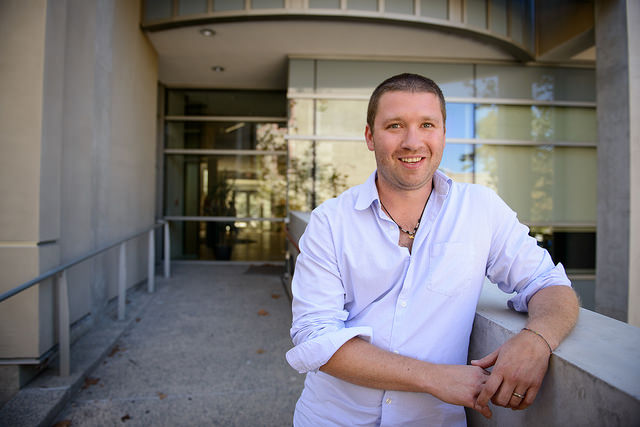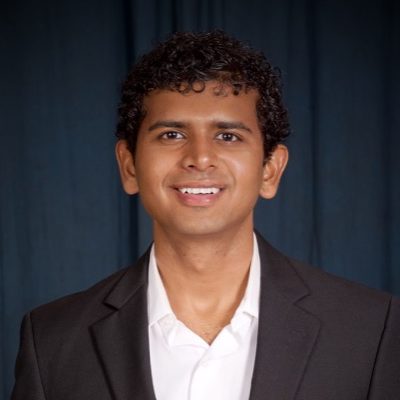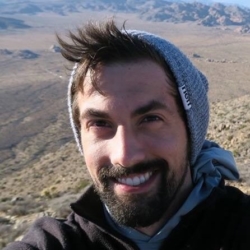

CSE research assistant professor Nadir Weibel is leading a small, interdisciplinary team that has been awarded a Frontier of Innovation Scholars Program grant to pursue a sensor-based approach to multimodal stroke signature.
The so-called Stroke-Kinect team includes colleagues in bioengineering, computer science and the UC San Diego School of Medicine. Led by CSE's Weibel -- who is also a member of the Design Lab located in the Qualcomm Institute -- the project was awarded $50,000, which will fund two graduate students in Weibel's Human-Centered and Ubiquitous Computing Laboratory: Ph.D. student Vishwajith (Vish) Ramesh from Bioengineering, and CSE Ph.D. student Steven Rick on the project.
It was one of more than 400 high-caliber proposals submitted as part of this year's FISP grant solicitation by the university.

of Vish Ramesh's dissertation.
Stroke-Kinect is part of the primary research Ramesh is doing for his doctoral dissertation. His research interests are in characterizing the motor and cognitive abilities of patients with neurological disorders such as stroke, using ubiquitous computing technologies and machine learning and signal processing techniques. Ramesh aims to not only aid in diagnosis and rehabilitation of patients but also to develop biologically-grounded models of the afflicted brain.
Ramesh was first author on a poster laying out "A Neurobehavioral Evaluation System Using 3D Depth Tracking and Computer Vision" presented at the annual meeting of the Society for Neuroscience in 2016. In the abstract for that poster, he noted that analysis of depth data collected from stroke patients indicates accurate testing for the synchronicity of movements and reliable eye-gaze tracking. "These results suggest that larger data sets will permit identification of only the vital indicators in stroke diagnosis... to mitigate the risk of false negatives and erroneous prescriptions of [the clot-busting drug] rt-PA," noted Ramesh. "Stroke-Kinect also paves the way for the computational diagnosis of other neurological disorders, furthering the health sciences and ultimately aiding patients in their recovery."

CSE's Steven Rick also works in the Weibel, and he is a member of the Design Lab's Human Centered Healthcare team. He has worked on the basic data collection infrastructure for Stroke-Kinect. Rick did his undergraduate work at UC San Diego in Cognitive Science (B.S. '13) before switching to CSE. Currently his research focuses on computational ethnography -- the augmentation of human observational research with insight from unobtrusive and ubiquitous sensing. In the Design Lab, located on the first floor of Atkinson Hall, Rick helps apply a mix of methodologies toward the generation of better human understanding of health and healthcare coordination. Rick expects to complete his Ph.D. in 2020.
Stroke-Kinect is a new approach to characterizing the severity of ischemic stroke. The system exploits cutting-edge pervasive sensing technologies that unobtrusively capture body motion, eye tracking, and speech. The goal is to use all of these modes of communication and sensing -- hence 'multimodal' -- to understand the dynamics of human behavior and automatically assess clinical deficit scales more frequently and precisely than current human resources allow.
Team members aim to remove the subjectivity of human analysis in characterizing ischemic stroke, and to do so by allowing a more accurate quantification of specific behavioral patterns in individuals who have undergone a stroke. Another benefit of the system will be to enable rapid observation-diagnosis feedback loops by informing clinicians of patient deficits in real time. Weibel and his colleagues -- including Bioengineering professor Gert Cauwenberghs and School of Medicine neuroscience professor Brett Meyer (a top expert on stroke) -- will leverage campus expertise in neurology, stroke diagnosis and stroke rehabilitation. Stroke-Kinect will also collect and analyze multimodal data in the healthcare domain using pervasive sensing technologies, multi-year experience in neural computation and bioengineering, and via access to Meyer's UCSD Stroke Clinic.

